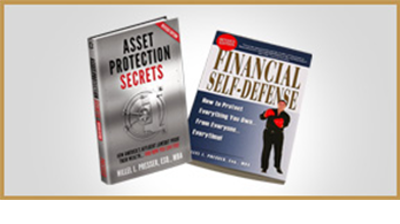

The Low Down on Corporations and Asset Protection
No business is too small to incorporate, because no business is safe from lawsuits. Obviously, the larger enterprise has more need for corporate protection because it is a larger lawsuit target, but still no business, no matter how small or seemingly safe, is immune from legal and financial disasters.
 A
corporation
creates a barrier between your personal assets and the corporation’s creditors. In other words, you gain ‘inside-out’ protection. You personally
insulate yourself from the debts of the corporation. But this too has
its limitations. If you own a corporation and get sued by a personal creditor,
your personal creditor can claim your shares in the corporation.
A
corporation
creates a barrier between your personal assets and the corporation’s creditors. In other words, you gain ‘inside-out’ protection. You personally
insulate yourself from the debts of the corporation. But this too has
its limitations. If you own a corporation and get sued by a personal creditor,
your personal creditor can claim your shares in the corporation.
If you own a substantial share of the corporation the creditor can then liquidate the corporation and claim its assets. That’s why we instead use limited partnerships, limited liability companies, irrevocable trusts or other protective firewalls to shelter your stock ownership in a corporation. So we rarely use corporations in our planning to protect personal assets, since the corporation offers no protective advantages over LLCs or LPs. Moreover, the corporation can impose negative tax consequences. From our view, the only place for the corporation is in business planning – and even then the corporation is less frequently the entity of choice for most small businesses.
S and C corporations provide the same limited liability. They differ only in how they are taxed. There are also restrictions as to who can be stockholders in an S corporation. One restriction is that S corporation shares cannot be owned by other entities. That limits your ability to protect your stock ownership and makes the S corporation an undesired Entity form for Asset Protection.
As far as personal assets – the corporation isn’t the best option. For a corporation to give you inside protection, you must transfer your personal wealth to the corporation. You would then no longer personally own your boat, car, paintings, etc.; instead your corporation would. Your personal creditor could not directly claim the assets owned by the corporation, however, they could seize your corporate shares. That’s the problem. Your ownership interest in the corporation can be seized and controlled by your personal creditor.
If you own a controlling interest in the corporation, your creditor would indirectly control your corporation’s assets. So you can never safely use the corporation alone to protect your personal assets. You must use a corporation in combination with other Asset Protection tools to adequately shield your personal assets. Nevertheless, a corporation can provide temporary shelter for personal assets.
For instance, one memorable client transferred $100,000 to a Nevada corporation only two days before a creditor won a sizable judgment against him. Had the client kept the bank account titled in his own name, the creditor would have immediately levied the account. But with his funds temporarily titled to a corporate account in another state, the creditor would first have to go through discovery before the creditor could find and seize the corporate shares. Of course, this gave us ample time to create a safer repository for his money.
In sum, the problem with using a corporation to protect personal assets is that you literally ‘chase your tail’. While your assets are no longer exposed, your shares are instead vulnerable. For protection, you must then find ways to protectively title your corporate shares, as they cannot be owned by you personally.
For more information regarding Asset Protection or Estate Planning, or would like a copy of best-selling books on Asset Protection (complimentary if you mention this blog).
— See more at: http://blog.vistage.com/finance/the-low-down-on-corporations-and-asset-protection/#sthash.Xfu6pvuI.dpuf
Yes, You Can Lose Everything!


-
 Schedule an Educational Presentation
Schedule an Educational Presentation -
 Asset Protection Quiz
Asset Protection Quiz -
 Read Our Complimentary Books
Read Our Complimentary Books -
 Attend Our Complimentary Webinar
Attend Our Complimentary Webinar



